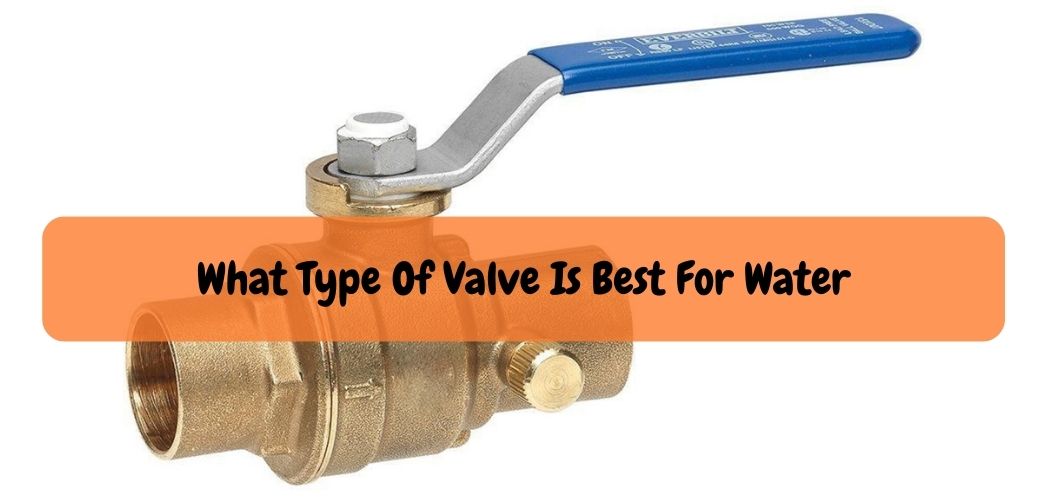A ball valve is the best type of valve for water. Ball valves have a simple design, are durable, and offer quick and easy shut-off capabilities.
Navigating the world of valves can be a daunting task, especially when it comes to selecting the ideal valve for water-related applications. Whether you’re managing a plumbing system, an industrial process, or a residential water supply,
The choice of valve plays a pivotal role in ensuring efficient flow control, longevity, and overall system reliability. With a plethora of valve types available, each designed to suit specific conditions and requirements,
Determining the best valve for water demands a comprehensive understanding of factors like pressure, temperature, flow rate, and intended use.
In this exploration, we delve into the realm of valves, dissecting the attributes and benefits of various valve types to uncover which ones prove to be the most fitting companions for the journey of water.
Understanding The Importance Of Water Valves In Your Home’S Plumbing System
Water valves are an essential component in the plumbing system of any home. Their primary function is to regulate the flow and pressure of water. There are different types of water valves available in the market, each designed for specific purposes.
For instance, gate valves are best for turning water on and off, while ball valves are ideal for reducing water flow. To determine if a water valve needs replacement, check for signs such as leaks, difficulty in turning the valve, or corrosion.
Overall, choosing the right type of water valve can make all the difference in ensuring a smooth functioning plumbing system in your home.
The Guide: What Type of Valve Is Best for Water?
Water is an essential element of our daily lives, and its controlled flow is crucial in various applications, ranging from residential plumbing to industrial processes. Selecting the right type of valve for water-related systems is paramount to ensure efficient operation.
Minimal maintenance, and overall system longevity. In this guide, we’ll explore the most common types of valves used for water control, their advantages, disadvantages, and the factors to consider when making your choice.
1. Introduction to Water Valves
Importance of proper valve selection
Factors influencing valve choice
2. Common Valve Types for Water:
Ball Valves
Gate Valves
Globe Valves
Butterfly Valves
Check Valves
3. Factors to Consider When Choosing a Valve:
Flow Rate and Pressure
Material Compatibility
Application (Residential, Commercial, Industrial)
Control Mechanism (On/Off or Throttling)
Installation and Maintenance
4 .Valve Advantages and Disadvantages:
Ball Valves
Gate Valves
Globe Valves
Butterfly Valves
Check Valves
5. Specialized Valves for Specific Water Applications:
Pressure Reducing Valves
Pressure Relief Valves
Solenoid Valves
Diaphragm Valves
6. Best Practices for Valve Installation and Maintenance:
Proper installation techniques
Regular maintenance and troubleshooting
Ensuring leak-free operation
7. Future Trends in Water Valve Technology:
Smart and automated valves
Enhanced materials for durability
Environmental considerations
8. Conclusion:
The importance of informed valve selection
Meeting specific application needs
Also Read: How Do You Flush a Pressurized Toilet Without Running Water?
Introduction to Water Valves:
Valves play a critical role in controlling the flow of water in various systems. Proper valve selection ensures efficient operation, prevents leaks, and optimizes the use of water resources. The choice of valve depends on factors such as the application’s requirements,
System pressure, flow rate, and the nature of the fluid being controlled. Whether you’re dealing with household plumbing or complex industrial processes, understanding the different valve types and their characteristics is essential for optimal system performance.
Common Valve Types for Water:
1. Ball Valves: Known for their quick shut-off capability and durability, ball valves are a popular choice for water systems. They offer a full flow path when open, reducing pressure drop and minimizing turbulence.
2. Gate Valves: Gate valves provide a straight-through flow path when fully open, making them suitable for applications where a minimum pressure drop is desired. They’re commonly used in water supply lines.
3. Globe Valves: These valves are versatile and offer good throttling capabilities, making them suitable for regulating flow. They’re often used in applications where precise flow control is essential.
4. Butterfly Valves: Butterfly valves are lightweight and compact, making them a cost-effective choice for larger diameter pipelines. They offer quick operation and are commonly used in water treatment systems.
5. Check Valves: Check valves allow flow in one direction and prevent backflow. They’re crucial in preventing water hammer and ensuring the integrity of systems.
Factors to Consider When Choosing a Valve:
Before selecting a valve for a water application, consider these factors:
- Flow Rate and Pressure: Choose a valve that can handle the system’s flow rate and pressure requirements without causing excessive pressure drop or leakage.
- Material Compatibility: The valve material should be compatible with the water’s properties to prevent corrosion and ensure longevity.
- Application: Consider whether the valve will be used in a residential, commercial, or industrial setting, as different applications have varying demands.
- Control Mechanism: Determine whether the valve will be used for simple on/off control or if it needs to provide precise throttling capabilities.
- Installation and Maintenance: Ease of installation and maintenance is important for minimizing downtime and ensuring long-term reliability.
Valve Advantages and Disadvantages:
Understanding the advantages and disadvantages of each valve type is crucial:
- Ball Valves: Pros – Quick shut-off, minimal pressure drop. Cons – Limited fine flow control.
- Gate Valves: Pros – Straight-through flow, minimal pressure drop. Cons – Slower operation, not ideal for throttling.
- Globe Valves: Pros – Precise flow control, good throttling capability. Cons – Higher pressure drop compared to other types.
- Butterfly Valves: Pros – Compact, cost-effective for large pipes. Cons – Reduced precision in throttling, potential for water hammer.
- Check Valves: Pros – Prevent backflow and water hammer. Cons – Limited to one-directional flow.
Specialized Valves for Specific Water Applications:
Certain applications require specialized valves:
- Pressure Reducing Valves: Maintain constant downstream pressure, ideal for water supply systems.
- Pressure Relief Valves: Protect systems from overpressure, commonly used in water heaters and boilers.
- Solenoid Valves: Enable remote or automated control of water flow, suitable for irrigation and industrial automation.
- Diaphragm Valves: Provide excellent flow control for corrosive or abrasive water, commonly used in wastewater treatment.
Best Practices for Valve Installation and Maintenance:
- Follow manufacturer guidelines for proper installation to ensure leak-free operation.
- Regularly inspect valves for signs of wear, corrosion, or leaks.
- Perform maintenance tasks such as lubrication, packing replacement, and cleaning according to recommended schedules.
Future Trends in Water Valve Technology:
- Smart and Automated Valves: Integration of sensors and automation technology for remote monitoring and control.
- Enhanced Materials for Durability: Development of materials that offer better resistance to corrosion and wear.
- Environmental Considerations: Valves designed for water conservation and reduced environmental impact.
Also Read: Why is My Toilet Tank Not Filling Hard Water?
Factors To Consider When Choosing The Best Water Valve
Choosing the right water valve for your plumbing system can pose several challenges. To find the best valve for your needs, it’s important to factor in aspects such as location, application, material, and durability. Consider the size and compatibility requirements for your specific setup as well as your budget constraints.
The location and application of the valve determine the ideal type of valve to use, for example, a gate valve or a ball valve. The material and durability of the valve will affect its lifespan and performance. Size and compatibility are essential to ensure proper fitting and functionality,
while budget considerations can help determine the most cost-effective option. Take the time to research your options thoroughly, so you can find the perfect fit for your plumbing system.
Frequently Asked Questions Of What Type Of Valve Is Best For Water?
What Is The Best Type Of Valve For Water?
The best type of valve for water is a ball valve due to its durability and ease of use.
How Does A Ball Valve Work?
A ball valve works through a quarter-turn rotational movement of a ball-shaped disk to regulate the flow of water.
What Are The Benefits Of Using A Gate Valve For Water?
Gate valves provide full bore flow without loss of pressure, while their design makes them ideal for regulating high-volume water flow.
Why Is A Multi-Turn Valve Not Ideal For Water?
Multi-turn valves are ideal for use with high-pressure gas, but they tend to leak and are generally unsuitable for regulating high-volume water flow.
Can A Butterfly Valve Be Used For Water?
Butterfly valves are well-suited to large-scale industrial applications where the amount and pressure of water are constant. They cannot control variable water flow.
Conclusion
Choosing the right valve for maintaining the water flow in your home is an important decision. The type of valve you choose will ultimately depend on your individual needs, preferences, and budget. A ball valve may offer greater durability and longevity, while a gate valve may be more affordable and efficient for water flow control.
Similarly, a butterfly valve can provide accurate flow regulation, while a globe valve is ideal for regulating water pressure. By considering all of the above factors, you can choose the valve that fits your needs. It’s always best to consult an experienced plumber, who can help you make an informed decision when selecting the right valve for your water system.
Ultimately, investing in a high-quality valve will ensure longevity, durability and efficiency in your water system for years to come.

